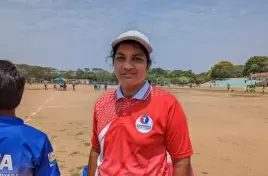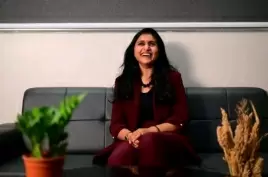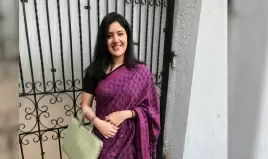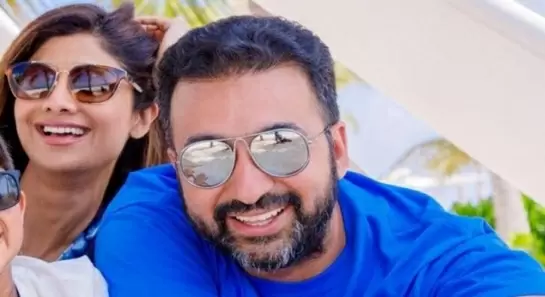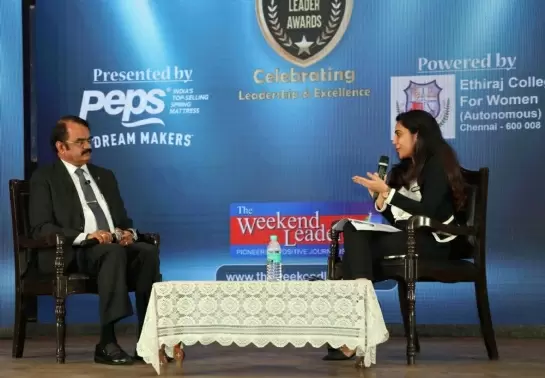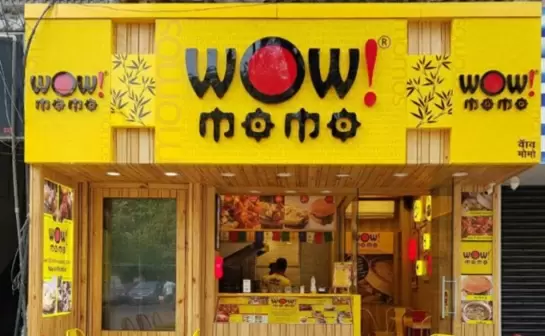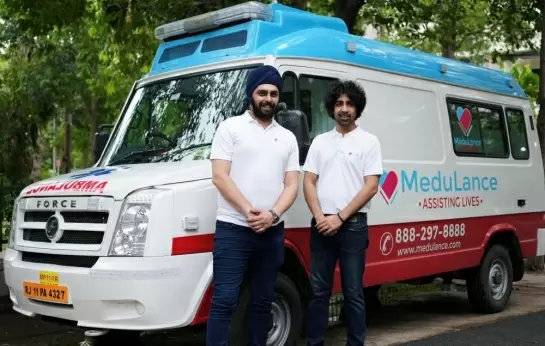The dreadful night when India lost its hard earned freedom

25-June-2012
Vol 3 | Issue 25
Though 37 years have gone past, midnight of 25/26 June 1975 is deeply etched in my memory. It was during this night the hard earned freedom of India was stolen away from the hapless people of India through deceit and fraud indulged in by the then Prime Minister Indira Gandhi, her son Sanjay Gandhi with the coterie around them.
The sordid saga of National Emergency [from June 1975 to February 1977], which imposed dictatorship by suspending India’s Constitution and depriving Fundamental Rights to its citizens, is the most devious and dubious chapter in India’s 56 years existence as a sovereign, independent nation.
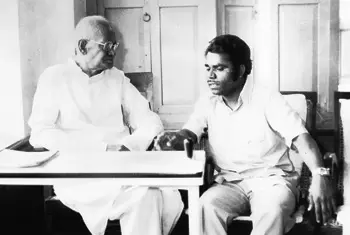 |
|
Devasahayam seen here in a conversation with JP
|
The worst thing about emergency was that it ripped apart the delicately crafted and carefully nurtured democratic fabric of a poor nation wherein lived one/sixth of the human race.
Basic violations of the democratic spirit and the crude attempts to legitimize a new type of regime and new criteria of allocation of rights and obligations were more central to what the Emergency was about than arrest and torture of a few thousand individuals.
It was the abrogation of any sense of boundary or restraint in the exercise of power, and the striking growth of arbitrariness and arrogance with which citizens were turned into subjects that was at issue.
It was a state off-limits, a government that hijacked the whole edifice of the state, a ruling party and leader who in effect treated the state as their personal estate.
It was the imposition of a highly concentrated apparatus of power on a fundamentally federal society and the turning over of this centralized apparatus for personal survival and family aggrandizement.
It was one big swoop overtaking the whole country spreading a psychosis of fear and terror with the new upstarts (Sanjay and all) storming away through whatever came their way, pulling it all down and calling boo to it all. The tragedy is that such ‘style of misgovernance’ still persists as if it came through the baptism of Emergency!
Far more pertinent than this act of imposition of an Emergency regime is the manner in which the nation almost capitulated, to a man, with so few exceptions in such a vast land.
There were no doubt protests and acts of both courage and imagination. All these were individual ‘heroics’, which is all that these individuals could do. But they hardly had any great impact on the course of things.
But there was one individual called Jayaprakash Narayan (JP) and the action of this individual did have great impact not only on the course of things but on country’s history.
It was this individual who fought the emergency regime relentlessly and through rare display of tenacity and leadership (despite his failing health) restored India to democracy within a short period.
I had the rare privilege of having this man as my ‘emergency prisoner’ for near six months.
There was no serious law & order problem anywhere in the country, least of all in Chandigarh to warrant imposition of Emergency.
This is what Justice J.C.Shah, the one-man Commission appointed by the Janata Government to enquire into the emergency excesses, has to say: “There was no evidence of breakdown of law and order in any part of the country, nor of any apprehension on that behalf. The economic condition was also well under control and had in no way deteriorated.
“There was not even a report of an apprehension of any serious breakdown of the law and order situation or deterioration of economic condition from any public functionary. The public records of that time, both secret and public, and newspapers spoke with unanimity that there was no unusual event or even a tendency in that direction to justify the imposition of Emergency”
On the first morning of Emergency (26th June 2012) Union Territory of Chandigarh was the standing testimony of the normalcy that Justice Shah was referring to. It was so normal that I had gone for my morning tennis work out as usual.
More than the law & order situation the main reason for JP to be brought to Chandigarh was the presence of PGI where he could be given the best of medical treatment. Initially he was put up at the PGI Guest House and later at the yet-to-be commissioned special ward. Both the places were temporarily declared as jail. JP was never sent to the Sub-jail at Burail.
There were several experiences I could recount from the Emergency days, but I will mention three major ones – THE TRIBUNE episode, JP’s stay as my emergency prisoner and my brief encounter with former Prime Minister Chandra Shekhar.
THE TRIBUNE episode
Past midnight of 25-26 June 1975, on verbal directions from the Delhi Durbar, Giani Zail Singh, Chief Minister of Punjab called up Mr. N.P.Mathur, Chief Commissioner of Chandigarh to say that Emergency had been declared and press had to be severely disciplined.
He was specific that THE TRIBUNE should be sealed and should not be allowed to come out that morning. Zail Singh even wanted the arrest of Mr. Madhavan Nair, infirm but fiercely independent editor of THE TRIBUNE, then a household name in the Northwestern part of India.
Chandigarh Administration did not comply with this ‘direction’. Senior Superintendent of Police ML Bhanot however went through the motion of going to THE TRIBUNE premises and advised those on duty not to print any news unpalatable to the ‘powers-that-be’. He also posted a small posse of policemen to keep a watch on the press.
Obviously this did not have much impact on THE TRIBUNE and the morning paper came out as usual. This infuriated another Chief Minister – Chaudhry Bansi Lal of Haryana. In his inimitable style he threatened that if Chandigarh Administration was not willing to raid THE TRIBUNE, seal its premises and arrest its editor, he will get it done through the Haryana Police!
I as the District Magistrate had to work overtime to rein in the anger of two powerful Chief Ministers while avoiding any draconian action against THE TRIBUNE, which our conscience did not allow. It was indeed a perilous balancing act which we carried out successfully!
Chandra Shekhar
On July 8th Mr. Chandra Shekhar who had been detained under MISA, was brought to Chandigarh from Rohtak Jail. His only sin was his refusal to endorse emergency and issue a statement condemning JP and hailing the ruling coterie. Though his stay in Burail sub-jail was brief before being shifted to Patiala, it was quite eventful.
One incident however left a lingering bitterness in him, which perhaps he is nursing even today, is worth narrating. On 10th July, in the afternoon about 3.00 P.M. 6 persons – Chandra Shekhar’s brother Kirpa Shankar Singh, brother-in-law, two friends and two kids - Mr. Shekhar’s son [Neeraj, aged 6] and nephew [aged 7] - came to me and asked for interview with the Young Turk.
Only the previous evening we had received strict instructions from Union Home Ministry through a Wireless Crash message totally prohibiting interviews with friends and banning interviews even with close relatives “except in an extreme situation on humanitarian grounds like serious illness of detainee”.
However I took a risk to partially disregard the rules by allowing the kids to have a good meeting with Mr. Chandra Shekhar that very evening. Nevertheless on hearing of what happened he went into a rage and threw up tantrums.
I met Chandra Shekhar in jail the next day. As I walked in he was reading the book, “Man’s search for meaning”. Contrary to the tenor of his letters, he was polite and respectful. His eyes were wandering and piercing as if something was burning in him.
Despite my explanation and quoting Government of India rules and the prevailing atmosphere he persisted with his protest against ‘solitary confinement’ and denial of interviews with his closest relatives.
Then he came to the point and made three specific requests:
• Permission to take a stroll in the morning and evening
• Permission to sleep in the open
• Permission to live in the barracks along with other prisoners and if this was not possible, permission to be with other detainees in the sub jail for an hour or two every day.
For the first and second request I gave permission on the spot. The third request needed some consideration and I said I would revert back to him shortly.
But before I could respond to him on his third request, Chandra Shekhar was shifted to Patiala jail where he was virtually under ‘solitary confinement’ for several months.
Lok Nayak Jayaprakash Narayan
When I received ‘prisoner JP’ at the tarmac of Chandigarh’s Air Force base on the night of 1st July 1975, Emergency was just a few days old. JP had been taken into custody under the dreaded Maintenance of Internal Security Act by the District Magistrate, Delhi on 25/26 June night, moved around nearby areas of Haryana and Delhi’s All India Institute of Medical Sciences, and was being brought to Chandigarh for safe custody and medical care. He was taken directly to the PGI Guest House, specially done up for the purpose.
Something in my sub-conscience told me that JP was not an ordinary man and his days in confinement would one day be part of history.
As I drove back home from PGI Guest House around midnight, my mind went back to the days of India celebrating Independence, when I was a tiny toddler.
I vaguely remembered that in the far corner of the country where I belonged [Kanyakumari, the Land’s End of India] it was JP’s name, which was on everyone’s lips. And his name was spoken in awe and admiration.
Now also, within one year of his coming back to active public life, he has roused the people and their conscience, which was lying dormant all the while. In such a short period he had become the idol of the youth and the leader of a mass movement, which shook the Governments at their very foundation.
There must be something extraordinary in this man and I should get to know him, I mused to myself. Besides, he is talking about ‘power to the people’ and ‘honest and participatory governance’, two things, which have been dear to my heart.
There was another very important aspect. Though I was a Civil Servant administering the Emergency regime in the Union Territory, in my heart of hearts I did not like this ‘trammeling’ of Freedom since I was of the firm conviction that Democracy, howsoever imperfect, was the only thing we Indians could really be proud of.
So during the five and a half months JP was in confinement at Chandigarh, I did come to know him very closely. And having understood the nobility of his struggle and the intensity of his commitment, partook in all matters concerning him and the State, shared his intimate thoughts and feelings, discussed political events and happenings, played ‘Devil’s Advocate’, participated in brainstorming and strategy sessions, took charge of his mental and psychological well-being, initiated the reconciliation process between him and the Prime Minister and succeeded in reviving his faith in himself and his people which he was on the verge of losing.
In short I became part and parcel of the transformation of the ‘dare-devil hero’ of the first freedom struggle from a ‘defeated idol’ to an ‘inspiring icon’ who 16 months later led the Opposition forces successfully to win India its second freedom.
MG Devasahayam is a retd. IAS officer, who served as District Commissioner of Chandigarh during the Emergency, and the author of 'JP Movement, Emergency and India's Second Freedom'
Note: Devasahayam’s interview to Sam Rajappa on allegations about the failure of JP’s kidneys due to medical ill-treatment in the PGI will appear in The Weekend Leader tomorrow



